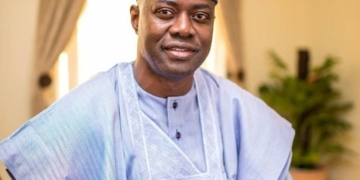Last week, somewhere around the Ejigbo area of Lagos, I saw an Alajo (daily contributions-collector) stroll out of an olosho (commercial sex workers’) house. I am not one given to assumptions or hasty generalisations but she had a modesty so holy about her that my curiosity became insanely exacerbated.
She wore no earrings, her hair was in simple braids, her skirt was loose and she had the countenance of a rapture-ready “born again” Christian. I had to ask and after being assured that she was indeed a follower of Christ who also doubled as the licensed collector of daily contributions for the area Oloshos, I sank into a deep reflection. I wish I had asked if she was not conflicted about the seeming incompatibility of her religious views with the very business which produces the capital for her venture.
When she dances towards the altar to drop her offering on the last Sunday of the month, does she feel a prick in her conscience? Does anything about the sermon from the pulpit cut deep through her very being or does it further serenade her perfected indifference about the “whatever-ness” of the source of the offerings she brings into the House of the Lord?
Her perfected indifference or the convenient separation of religious demands from her everyday life epitomises the high hypocrisy to be found in our general engagement with religion.
It highlights the sad ironies in the sharp contrasts between our renowned national piety on the one hand and the glorification of graft and criminality on the other hand. It explains why we export so much of merchandised religiosity to the rest of the world but fail to retain a little of that to address some of our domestic maladies.
The veteran journalist, Uncle Jimi, recently joked on his radio show about how Nigeria is the only country in the world where you get on a bus and when someone suddenly says ‘Can we bow our heads for prayer’ on a Monday morning, everybody’s head lowers in obedience, including the driver’s! Recently, Timi Dakolo ranted about an Abuja cleric who is supposed to be in jail for his alleged unholy exploitation of young girls and all hell broke loose. He was threatened, cautioned and warned about the sinfulness of chastising a “man of God”. Even the few comments in Dakolo’s support didn’t seem to have come from an analytical engagement with the alleged criminality in the cleric’s act but generally from the ‘it is well’ and ‘God will judge’ kind of mentality.
It is in the context of that blind, sheepish and largely ignorant engagement with religion that one finds the threat issued by The Muslim Rights Concern to musician Falz about his ‘This is Nigeria’ track very annoying and largely disturbing. The song, an imitation of an American song with a similar title, parodies the goings-on in a country fraught with a myriad of national challenges. It’s an effective attempt at a didactic satire in the hope that social consciousness will be awakened in a way which engenders meaningful conversations focused on leveraging effective strategies to combat our problems. The song clearly addresses the rampant insecurity, herdsmen killings, police brutality, youth restiveness, criminality and corruption in the land.
Unfortunately, rather than address the serious issues raised, the hoopla has been about the singer’s right to point out the issues and his alleged violation of certain religious sensibilities. The angst has been about Falz’s preferred costume and his “unholy” depiction of a certain tribe in the video. Do we hasten to condemn Boko Haram for using hijab-wearing young girls as suicide bombers with the same alacrity or rush to the plight of the victims of the senseless slaughters occurring daily in the Middle Belt? Why do we hasten with so much unchecked ignorance to defend the “God” who is more than capable of defending Himself but care less about the social injustice, oppression, wickedness and satanic exploitations going on around us?
It is time we got seriously talking about the issues militating against the country’s progress and stopped window-dressing or elevating religious preferences to frontal national issues. Political and religious leaders have looted the country and their congregations under the guise of religion for far too long, one would expect that we ought to have become enlightened enough to realise that continuing to travel a path which has hampered our national progress for this long is no longer tenable.
We must move consciously in the direction of reason so that when cogent issues are raised, we go beyond our religious biases to engage and analyse the issues so that after the reasoned distillation, we can retain refined points capable of launching us to national greatness.
•Abayomi Ojo, Magodo, Lagos
samyom5@yahoo.com






Discussion about this post